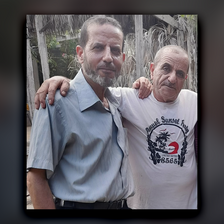The Electronic Intifada 5 June 2023

Israeli airstrikes in May 2023 on Gaza inflicted damage to crops and soil and confined many farmers to their homes.
APA imagesThe last month of spring is typically a busy time for farmers in Gaza. In Khuzaa, a town in southeastern Gaza, the crops would just be showing their promise.
But this May only brought destruction and death to Gaza’s farming communities, as Israel’s five days of attacks on the Strip prevented farmers from tending to their crops.
Aseel al-Najjar, Ghaida Qudeih and Nadine Abu Rouk run a thriving farm of approximately 1.5 acres in Khuzaa.
“Our farm is located just 500 meters [a third of a mile] from the so-called security fence [with Israel],” al-Najjar said. “And in the midst of the war and air raids, reaching our land meant risking our lives – it even meant death.”
The Israeli airstrikes meant that the farmers were confined to their homes, unable to venture outside due to the danger posed by Israel’s warplanes.
And though they had worked diligently for three years to cultivate their land – a task that is already difficult given Israel’s poisoning of Gaza’s soil with noxious herbicides – their melon and tomato crops that had shown such promise had now withered due to a loss of water for five consecutive days.
Damage is done
It is estimated that Israel’s May 2023 war on Gaza inflicted over $1.3 million in losses in the agricultural sector, according to the Palestinian agriculture ministry.
This amount includes indirect and direct damage by the Israeli attacks that extended to crops, irrigation wells, agriculture equipment and storage facilities.
Al-Najjar, Qudeih and Abu Rouk depend on multiple sources of water to irrigate their Khuzaa farm, including wells and retention ponds. But due to the high salinity of the water they collect, they also have to purchase water from Israel’s state water company, Mekorot, which is twice the cost of well water.
The three women, all in their twenties and from the Khan Younis area of Gaza, grew up in farming families, but they had never anticipated becoming farmers themselves. They completed their university degrees in fields such as education, commerce and finance, but the post-graduation job hunt was a dead end.
Unemployment in Gaza is staggeringly high due to the ongoing Israeli blockade.
Agriculture, to them, seemed like a promising alternative.
“Encouragement and support from our families were abundant,” Qudeih said, “as agriculture has been a cherished profession handed down through generations.”
In that, they were well aware of the hardships that accompany farming in Gaza, but the near constant setbacks are becoming difficult to endure.
Not the first time
In May 2021, during a major Israeli attack on Gaza, Israel fired missiles near the women’s farmland in Khuzaa, leaving behind unexploded ordnance. Just as in 2023, al-Najjar, Qudeih and Abu Rouk were unable to reach their land to irrigate, so they lost more than half an acre worth of crops.
Furthermore, they found that when they tried to plant crops anew, they did not thrive. The soil had been contaminated with toxic substances, likely herbicides, sprayed by Israeli planes.
“I still remember the moment I went back to check on my land,” al-Najjar said. “I was heartbroken when I learned that the crops of tomatoes, cucumber and other vegetables had died and withered.”
Over time, they recovered from that loss, once again taking to the land and cultivating new crops.
Now, three years later, the loss hits deeper.
Al-Najjar described it as an “immense setback” to their livelihoods. “I don’t know what to do to compensate for all the losses we’ve incurred.”
They also understand that others fared far worse in the latest Israeli attack.
On the morning of 10 May, the Israelis used a drone to fire a missile at farmer Muhammad Abu Taima, killing him. He had been outside on a farm in Abasan al-Kabira, not far from Khuzaa.
“I knew Muhammad very well,” Abu Rouk said. “He exuded pride in his agricultural work. In spite of how dangerous it was, he continued to work the land regardless of the escalation and the tense atmosphere. He was a day laborer and had a family to provide for.”
The three farmers mourn his death and continue to think ahead, about how to plan for their futures.
Several days before the Israeli attack, they received word that they had received funding from the German government via the GIZ foundation to establish a farm of almost two acres.
“The dream persists despite the loss of the crops,” al-Najjar said.
The author is a freelance writer and translator from Gaza.





